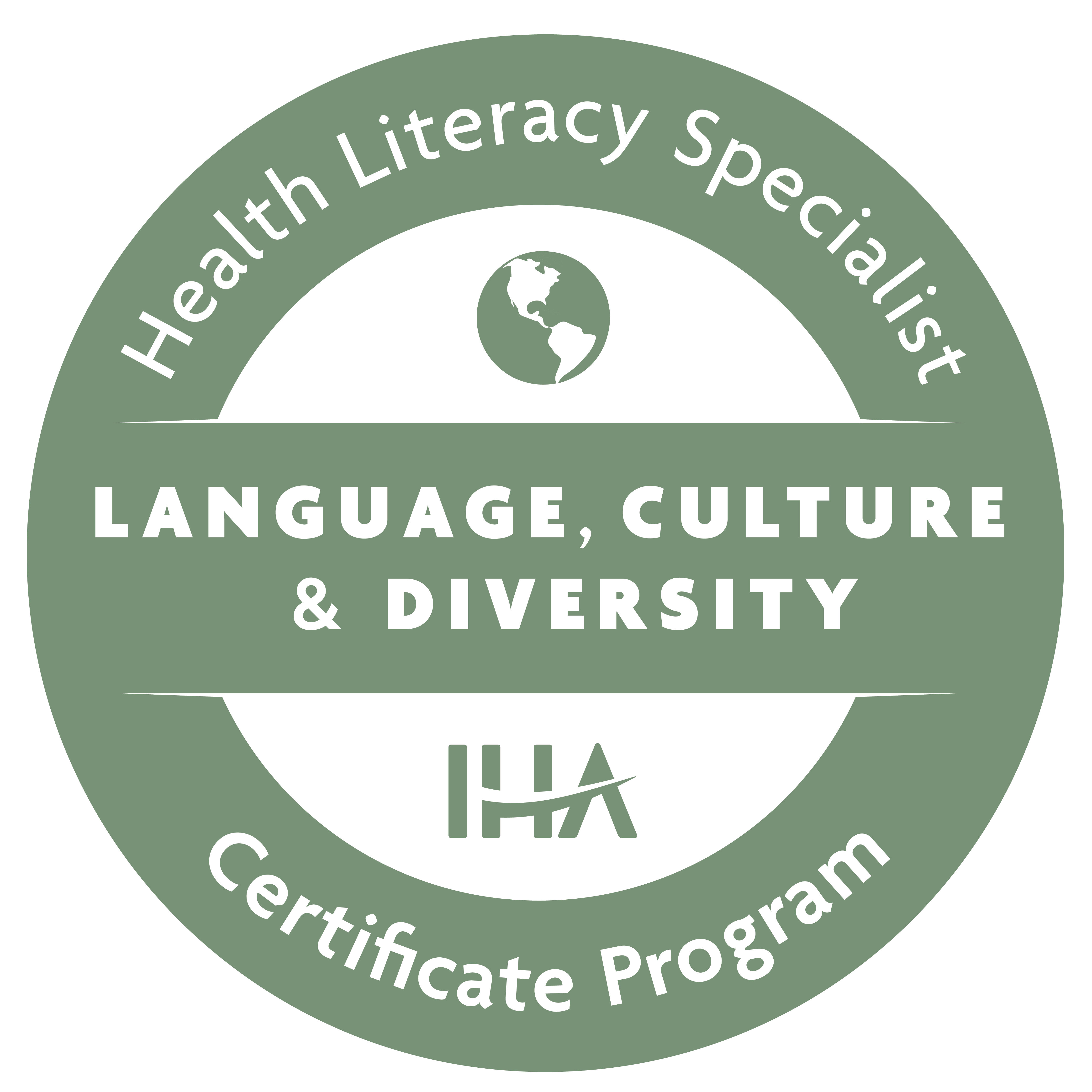
Health Literacy Specialist Certificate Program
Whether you’re new to the healthcare field or have years of experience, this certificate program will enhance your health literacy knowledge and ability to complete tasks in your work environment.
The program consists of 50 lessons across 7 critical health literacy domains. Each domain represents an online, self-paced course called a micro-credential. Complete all 7 micro-credentials to earn the Health Literacy Specialist (HLS) Certificate. The program is on a Learning Management System (LMS) that enables you to participate at a self-managed pace.
After completing the micro-credentials and passing the summative exam, you’ll receive:
- A digital badge
- A certificate of completion
- Up to 49 continuing education credits (see our FAQ page for CE information
The micro-credentials are also available individually, and result in a certificate, digital badge and applicable continuing education. You will still register on the LMS and purchase only the specific micro-credential(s) you want. For the description, individual pricing, continuing education information and to register, please click on “Learn More” under the micro-credential.
Testimonial Quotes from Recent Participants
Read what participants shared with us regarding their experience with IHA’s HLS Certificate program.
For more information or technical help, please contact us using our online support page or refer to the FAQ, Policies and General Information, and Health Literacy Specialist Model Job Description pages.
Register for The Complete Program Today!
Purchase all 7 micro-credentials and save 65%! Click the button below to register.
(Group discounts available - Contact us for details!)
You will need to create an account on IHA's Learning Management System (LMS) to register for the program. The Health Literacy Solutions Center log-in info is separate from the LMS.
Click Here to Register/Enroll
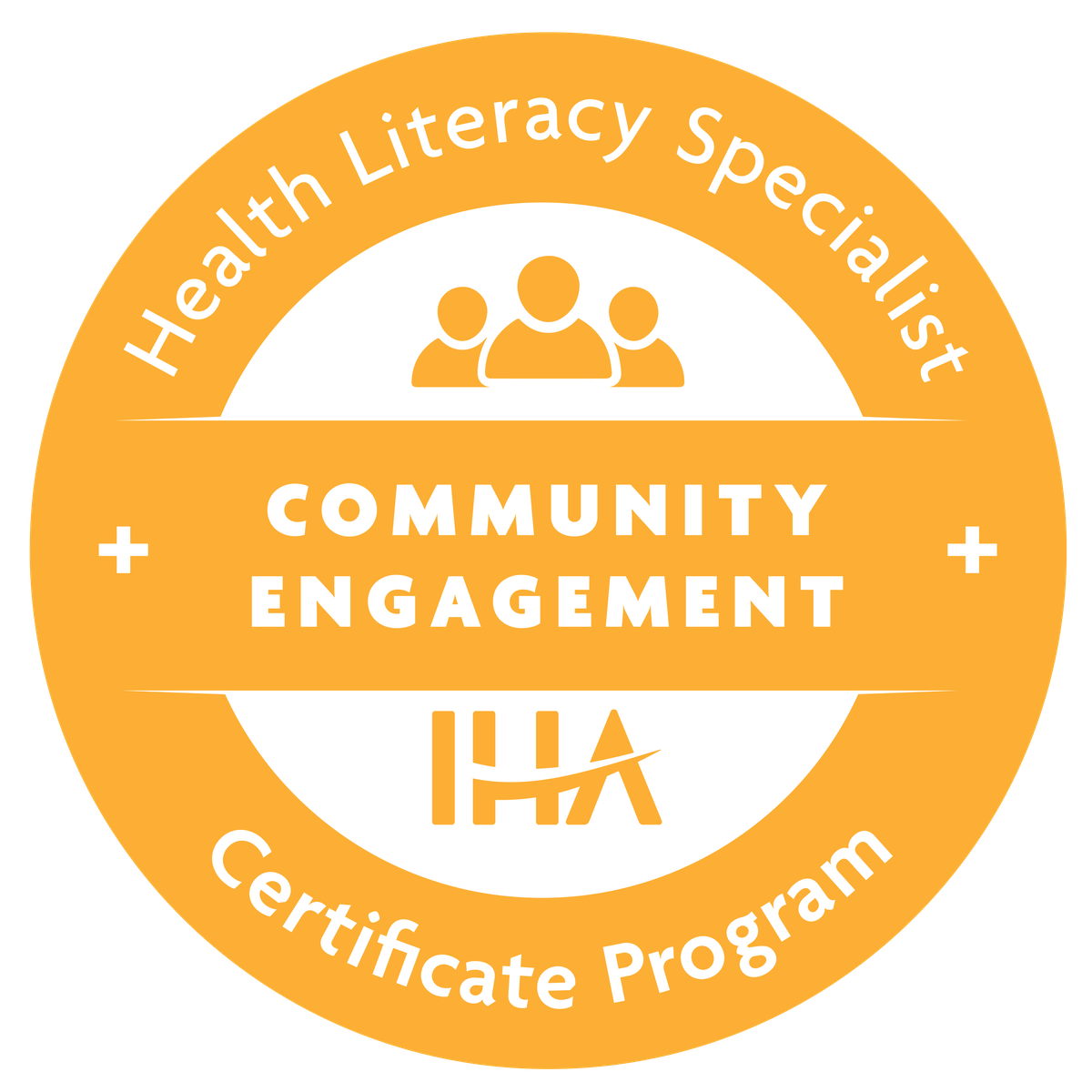
Community Engagement
Mobilize community partners to improve health literacy in the community. Work with these partners to assess community assets and needs for improving health literacy and to plan, implement, and evaluate a community health literacy initiative.
5 Lessons
Click "Learn More" for Price and Description
Mobilize community partners to improve health literacy in communities.
Community health literacy initiatives can be very effective because they are developed by and for community members, and because they reach people where they work, go to school, and live. Build relationships with partners to assess community needs to implement and evaluate health literacy initiatives.
MAP-IT Framework
This micro-credential uses the MAP-IT framework, created by the U.S. Department of Health and Human Services. This framework has 5 steps:
1) Mobilize
2) Assess
3) Plan
4) Implement
5) Track
- Lesson 1: You’ll learn how to prepare for community partnerships by define the partnership’s focus, thinking about what you want from community partners, and identifying potential community partners. You’ll also learn how to recruit community partners and sustain these partnerships.
- Lesson 2: You’ll learn about the value of assessing community assets and needs for improving health literacy. You’ll look at some examples of these assets and needs. You’ll also learn how to conduct an assessment and review some assessment tools.
- Lesson 3: You’ll learn how to identify a goal, objectives, and strategies for your community health literacy initiative. You’ll also learn how to create a work plan for the initiative.
- Lesson 4: You’ll learn how to communicate within your project team about your community health literacy initiative. The project team is composed of the subset of your community partners who are implementing your initiative. You’ll learn how to promote the initiative with your target audience, as well as with other audiences. You’ll also learn how to help your initiative succeed during implementation.
- Lesson 5: You’ll learn how to evaluate your community health literacy initiative. You’ll also learn how to use your evaluation results.
Complete all five lessons and pass the summative exam to earn your Community Engagement Micro-credential and digital badge.
This micro-credential takes approximately 5 hours to complete.
Earn 5 Continuing Education Credits in the following categories:
- CHES/MCHES (Category 1 Continuing Education Contact Hours) from NCHEC, Provider #101864
- California Nurses CEs from The California Board of Registered Nursing, CEP# 11933
- CPH Recertification Credits from National Board of Public Health Examiners’
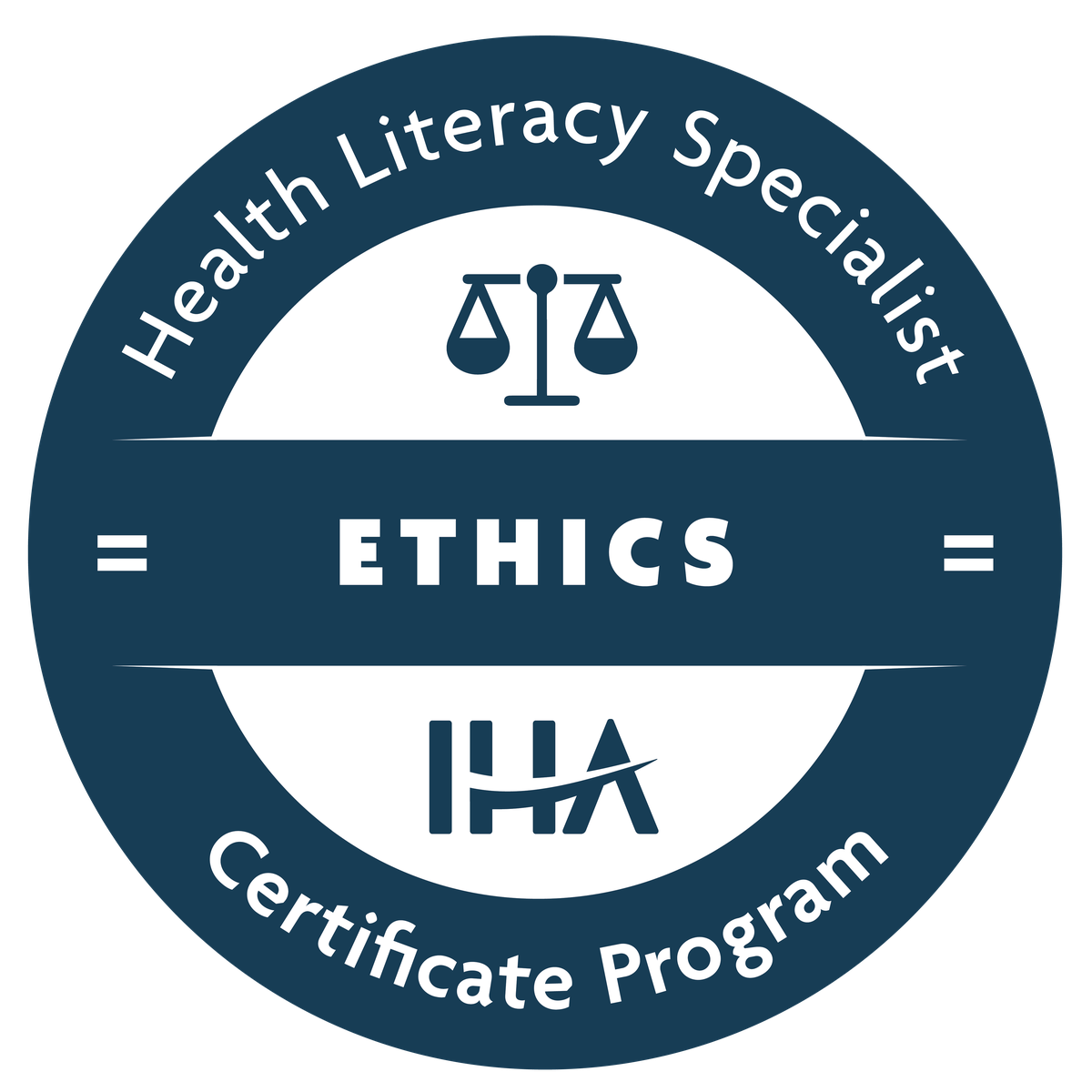
Ethics
Explore the intersection among health literacy, social justice, health equity, and ethics. Develop skills to use non- judgmental, non-shaming behaviors with patients and to use ethical and health literacy principles when conducting human research.
7 Lessons
Click "Learn More" for Price and Description
Explore how health literacy intersects with ethics — a code of morals.
Build an ethical foundation of trust with patients, the public, and research participants as you explore the relationship between health literacy and health equity, social justice, and community-based initiatives.
- Lesson 1: You’ll learn how to use teach-back to ensure that patients understand you, use shared decision making to help patients make a choice about healthcare, and communicate with patients from other cultures.
- Lesson 2: You’ll learn how to share bad news or medical errors in an ethical and empathetic manner, while promoting health literacy.
- Lesson 3: You’ll learn how to find current research and best practices related to health literacy. You’ll also learn how to evaluate health literacy research studies according to ethical standards.
- Lesson 4: You’ll learn about some ethical issues for conducting research that involves people. You’ll also learn how to promote health literacy when conducting research that involves people, and when obtaining consent for this type of research.
- Lesson 5: You’ll learn why it’s so important to disclose conflicts of interest, and how to disclose these conflicts. You’ll also learn why it’s so important to present accurate health information during the consent process, and how to present this information.
- Lesson 6: You’ll learn about key terms related to health equity and social justice. You’ll learn how improving health literacy contributes to health equity and social justice. You’ll also learn how to use the RESPECT model to communicate with patients from other cultures.
- Lesson 7: You’ll learn what co-creation is. You’ll also learn about health literacy and ethical reasons to co-create community-based health initiatives, and how to co-create these initiatives.
Complete all seven lessons and pass the summative exam to earn your Ethics Micro-credential and digital badge.
This micro-credential takes approximately 7 hours to complete.
This course has been approved for fulfilling the continuing education requirements of the American Health Information Management Association (AHIMA).Earn 7 Continuing Education Credits in the following categories:
- CHES/MCHES (Category 1 Continuing Education Contact Hours) from NCHEC, Provider #101864
- California Nurses CEs from The California Board of Registered Nursing, CEP# 11933
- CPH Recertification Credits from National Board of Public Health Examiners’
Language, Culture & Diversity
Apply health literacy principles when using a language access plan, working with interpreters, and working with translators. Promote health literacy by using cultural competence and cultural sensitivity.
6 Lessons
Click "Learn More" for Price and Description
Break down communication barriers of language, culture, and diversity.
Differences of language and culture can get in the way of effective communication. What happens when we must communicate with those who see things differently than we do, or even speak a different language? What if their health and well-being partly depend on what we say, what we do, and how well we communicate? Learn how to effectively provide information, service, or care across potential communication barriers whether you interact directly with people or write, and design written materials for distribution.
- Lesson 1: You’ll learn how a language access plan helps your organization promote health literacy and follow relevant laws. You’ll also learn how to create, implement, and evaluate a language access plan.
- Lesson 2: You’ll learn about the reasons for using skilled healthcare interpreters to convert a spoken or signed message from one language into another. You’ll also learn about the characteristics of qualified healthcare interpreters, and how to work effectively with them.
- Lesson 3: You’ll learn about the reasons for using skilled healthcare translators to convert a written message from one language to another. You’ll also learn about the characteristics of qualified healthcare translators, and how to work effectively with them.
- Lesson 4: You’ll learn how to use cultural competence to promote health literacy. You’ll learn how to exercise cultural sensitivity. You’ll also learn how cultural insensitivity contributes to health disparities.
- Lesson 5: You’ll learn how to communicate effectively between cultures in speech and writing.
- Lesson 6: You’ll learn general guidelines for communicating well with people who have disabilities. You’ll also learn how to communicate well with people who have these specific disabilities that are more likely to impede communication:
- Communication disorders (including hearing loss, speech sound disorders, and language disorders)
- Vision loss
- Deafblindness (having both vision loss and hearing loss)
- Cognitive problems (having trouble thinking, understanding, making decisions, learning new things, or remembering)
This micro-credential takes approximately 5 hours to complete. Complete all six lessons and pass the summative exam to earn your Language, Culture & Diversity Micro-credential and digital badge.
After completing the course, participants will:
- Contribute a health literacy perspective to the development, implementation, and evaluation of a language access plan.
- Contribute a health literacy perspective in collaborating with qualified healthcare interpreters and translators.
- Demonstrate an understanding of diverse cultures.
- Incorporate cultural factors and diverse perspectives into the two most fundamental health literacy activities: communicating effectively, both verbally and in writing.
- Communicate clearly and effectively with people who have disabilities.
Earn 5 Continuing Education Credits in the following categories:*
- CHES/MCHES (Category 1 Continuing Education Contact Hours) from NCHEC, Provider #101864
- California Nurses CEs from The California Board of Registered Nursing, CEP# 11933
- CPH Recertification Credits from National Board of Public Health Examiners’
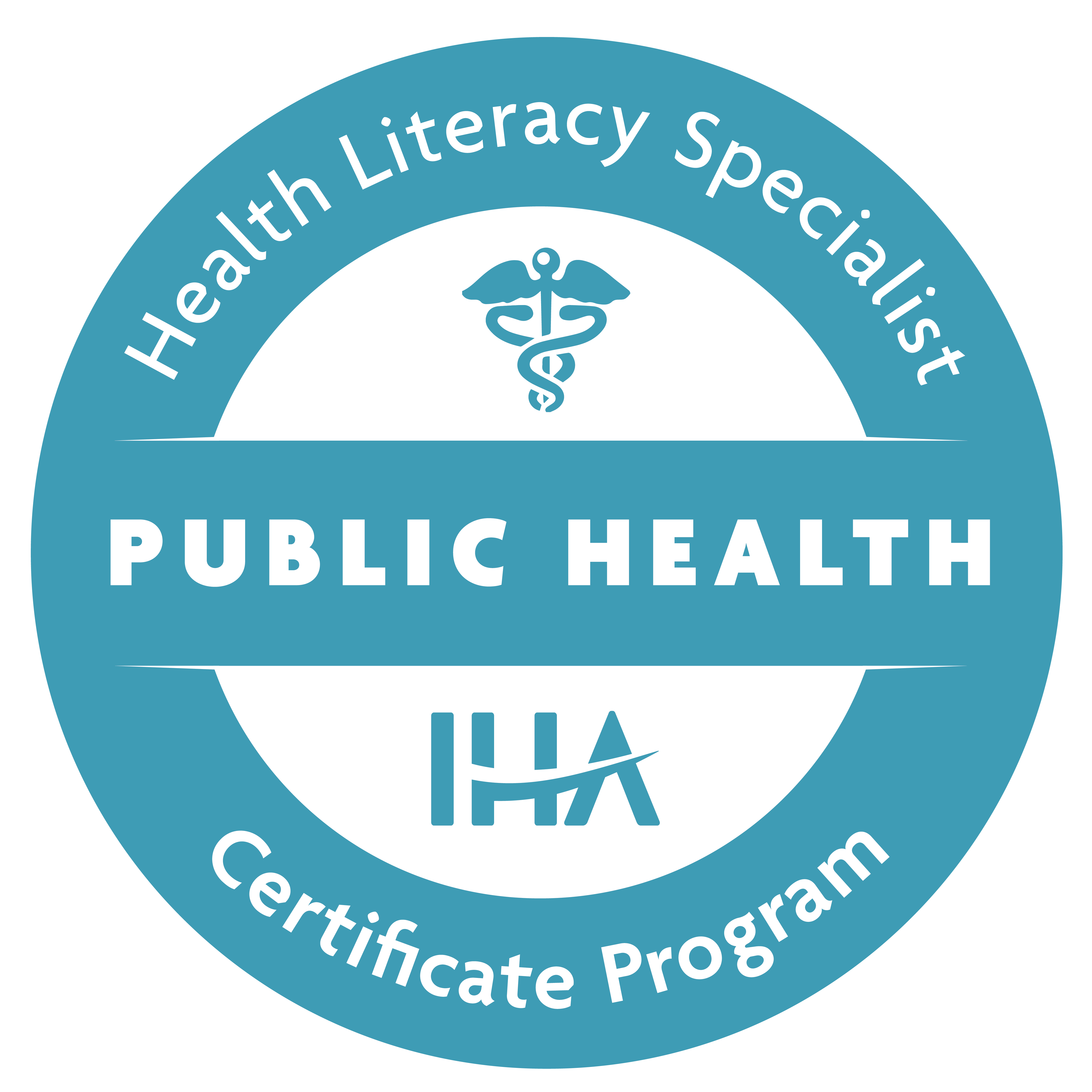
Public Health
Promote health literacy in high-risk public health situations, community-based public health interventions, and programs that help us stay well and prevent and manage chronic disease. Advocate to improve health literacy at the individual, group, organization, coalition, and policy level.
8 Lessons
Click "Learn More" for Price and Description
Explore the intersection of health literacy and public health.
The Centers for Disease Control and Prevention defines public health as “the science and art of preventing disease, prolonging life, and promoting health through the organized efforts and informed choices of society, organizations, public and private communities, and individuals.” A public health approach to health literacy considers how to bring equity to health information and communication, considering that low health literacy is common for many groups of people.
- Lesson 1: You’ll learn which groups of people are most likely to have low health literacy, and why low health literacy is a public health risk factor. You’ll learn how low health literacy affects public health outcomes. You’ll also learn about some public health methods to collect data on health literacy needs.
- Lesson 2: You’ll learn about public health approaches for understanding which groups have low health literacy. You learn about public health approaches for helping groups with low health literacy. You’ll also learn about the challenges of evaluating public health literacy initiatives.
- Lesson 3: You’ll learn how accurate, accessible, and actionable health and safety information supports health literacy. You’ll learn how to identify the characteristics and benefits of this type of information—and you’ll also learn how to use those attributes to develop quality content. Finally, you’ll learn how to create a review process to ensure health and safety information is accurate, accessible, and actionable.
- Lesson 4: You’ll learn why and how to use plain language in public health information and health behavior recommendations. You’ll also learn how to test the materials you’ve developed with your intended audience.
- Lesson 5: You’ll learn about some terms that relate to high-risk situations in public health. You’ll learn about health literacy challenges posed by high-risk situations. You’ll also learn how to address these challenges by making information about high-risk situations easy to find, understand, and use.
- Lesson 6: You’ll learn about community-based public health initiatives—and their link to health literacy. You’ll learn about community health literacy initiatives. You’ll also learn how to involve community members at each phase of a community health literacy initiative.
- Lesson 7: You’ll learn what health literacy advocacy means. You’ll also learn how to advocate for health literacy at 5 levels: 1) individual; 2) group; 3) organization; 4) coalition; and 5) policy.
- Lesson 8: You’ll learn about behavioral and environmental factors that help us stay well and prevent and manage chronic disease. You’ll look at some examples of programs that do the same. You’ll also learn how to promote health literacy through these programs.
Complete all eight lessons and pass the summative exam to earn your Public Health Micro-credential and digital badge.
This micro-credential takes approximately 8 hours to complete.
This course has been approved for fulfilling the continuing education requirements of the American Health Information Management Association (AHIMA).Earn 8 Continuing Education Credits in the following categories:*
- CHES/MCHES (Category 1 Continuing Education Contact Hours) from NCHEC, Provider #101864
- California Nurses CEs from The California Board of Registered Nursing, CEP# 11933
- CPH Recertification Credits from National Board of Public Health Examiners’
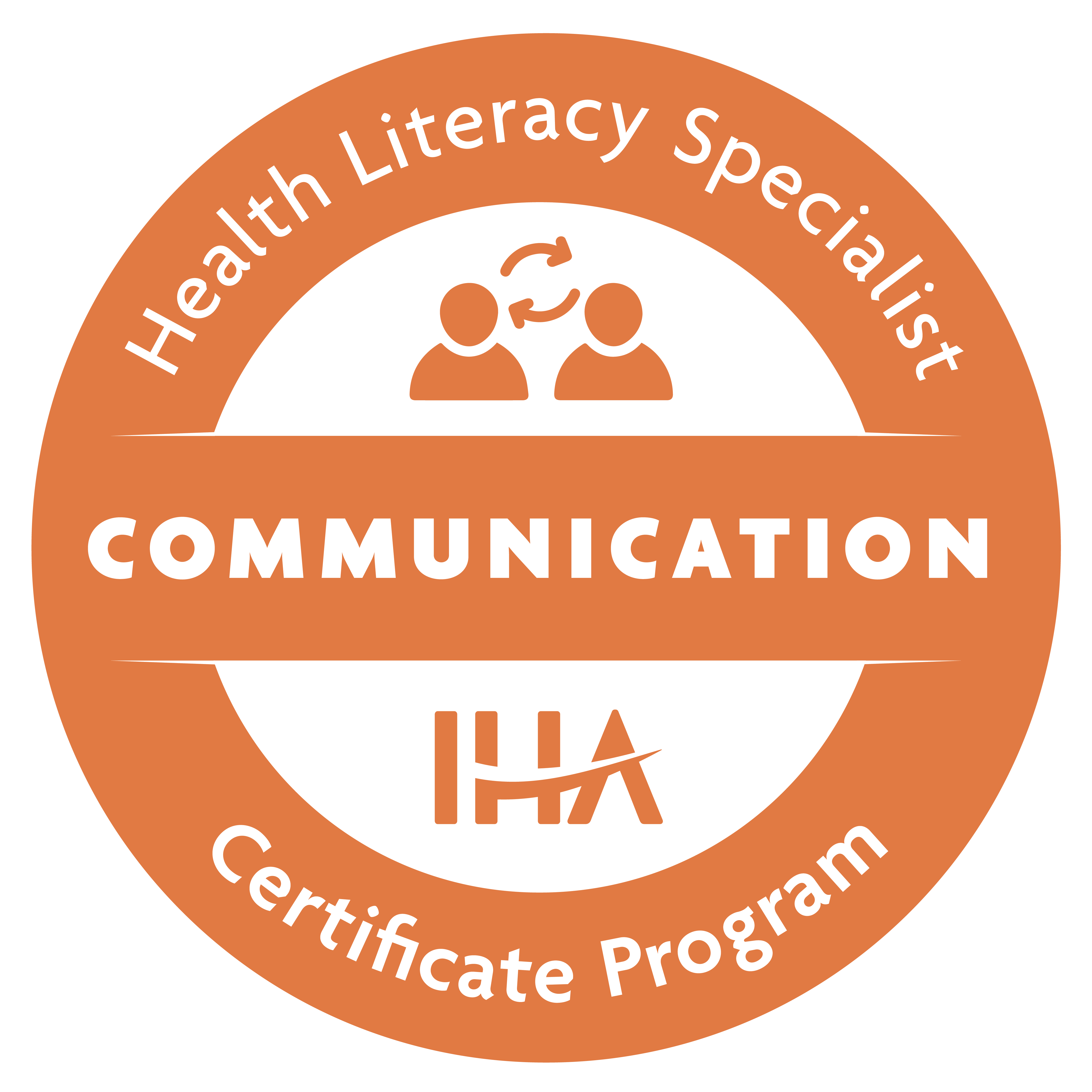
Communication
Develop your communication skills to promote health literacy, including effectively identifying needs and interests of unique audiences, developing plain language materials, and proper use of the health literacy practice of teach-back.
9 Lessons
Click "Learn More" for Price and Description
Promote health literacy in all forms of communication.
Develop your communication skills to promote health literacy, including effectively identifying needs and interests of unique audiences, developing plain language materials, and proper use of the health literacy practice of teach-back
- Lesson 1: You’ll learn about 3 plain language techniques providers can use to enhance clear and effective communication when speaking with patients and consumers about health information.
- Lesson 2: You’ll learn about plain language and its importance for health literacy, as well as 3 reasons people may need materials written in plain language. You’ll learn about 4 key plain language writing techniques that make content easier to read and understand. In addition, you’ll learn about grammar and punctuation rules that apply in plain language documents.
- Lesson 3: You’ll learn about 4 typography principles that can make a print or web document look easier to read. You’ll learn which typefaces are serif and which are sans serif, along with 4 layout principles that can make a print or web document look easier to read. You’ll learn about the correct method for placing text under bulleted lists, as well as 2 imagery principles that can enhance appeal. Finally, you’ll learn how to choose the photo that best aligns with a caption.
- Lesson 4: You’ll learn to identify the primary audience for your health information. You’ll learn how to discover their characteristics, needs, and interests. Finally, you’ll learn how to apply this knowledge to written and verbal communication.
- Lesson 5: You’ll learn about fundamental literacy and adult learners. You’ll learn why adopting a universal precautions approach is the preferred method to ensure patient and consumer understanding. You’ll learn about 7 potential “red flags” for limited fundamental literacy, and about 5 actions providers can take when they see these “red flags.”
- Lesson 6: You’ll learn how to engage a subject matter expert (SME) to provide content for plain language health materials. You’ll also learn how to work with your SME as you develop these materials.
- Lesson 7: You’ll learn about 3 free assessment tools: 1) Patient Education Materials Assessment Tool (PEMAT); 2) Clear Communication Index (Index); and 3) Suitability Assessment of Materials (SAM). You’ll learn about key similarities and differences among the PEMAT, Index, and SAM, and about the items that each tool measures. You’ll also look at a sample score report for each tool.
- Lesson 8: You’ll learn about the benefits and limits of readability formulas. You’ll also learn how to use readability formulas correctly, which electronic options are most accurate, which readability scores to consider, and how to use the scores to improve your text.
- Lesson 9: You’ll learn what teach-back is and how to use it. You’ll learn about strategies and tools for using teach-back. You’ll also learn how to make teach-back part of your organization’s routine practices.
Complete all nine lessons and pass the summative exam to earn your Communication Micro-credential and digital badge.
This micro-credential takes approximately 9 hours to complete.
This course has been approved for fulfilling the continuing education requirements of the American Health Information Management Association (AHIMA).Earn 9 Continuing Education Credits in the following categories:
- CHES/MCHES (Category 1 Continuing Education Contact Hours) from NCHEC, Provider #101864
- California Nurses CEs from The California Board of Registered Nursing, CEP# 11933
- CPH Recertification Credits from National Board of Public Health Examiners’
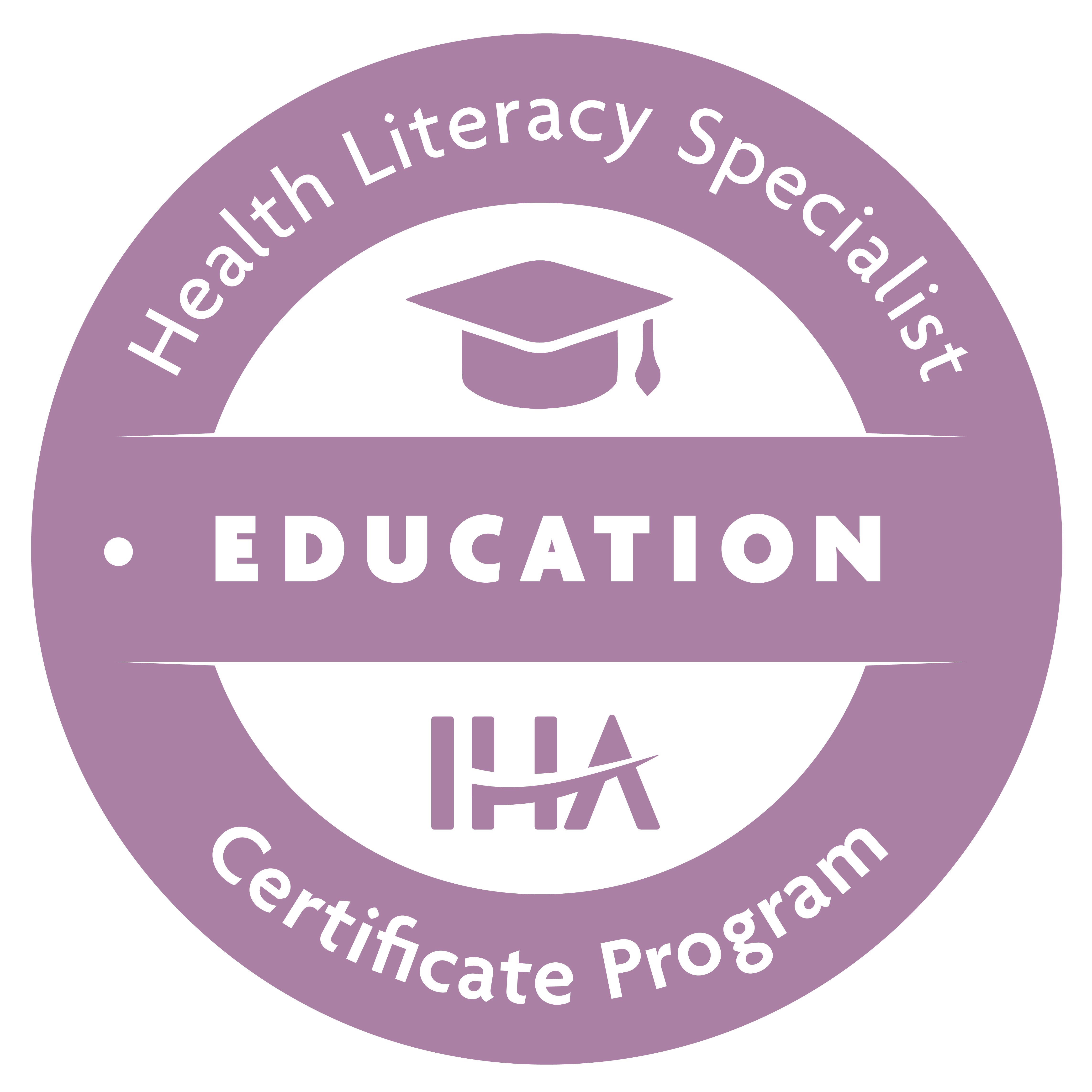
Education
Promote health literacy in individual and group education. This includes assessing and addressing learning needs and preferences, creating evidence-based health content for audiences with low literacy, and developing community health literacy education programs and a health literacy training for healthcare providers.
5 Lessons
Click "Learn More" for Price and Description
Promote health literacy in individual and group education.
Create evidence-based health content for audiences with low literacy, and develop community health literacy education programs and a health literacy training for healthcare providers by assessing and addressing learning needs and preferences
- Lesson 1: You’ll learn how to assess and address individuals’ learning needs and preferences.
- Lesson 2: You’ll learn how to make sure health content is evidence based and what low literacy is. In addition, you’ll learn how to tailor health materials to a low-literacy audience, and how to get feedback on these materials from your audience.
- Lesson 3: You’ll learn about 4 best practices for reducing numeracy demands. You’ll also learn about 2 best practices to support patients and clients who are given numeracy actions to take.
- Lesson 4: You’ll learn about community health literacy education programs, and how to mobilize community partners for such a program. You’ll also learn how to assess community assets and needs for this program, as well as how to plan the program.
- Lesson 5: You’ll learn how to develop an introductory health literacy training for healthcare providers that covers 3 topics: 1) health literacy; 2) using plain language; and 3) using teach-back.
Complete all five lessons and pass the summative exam to earn your Education Micro-credential and digital badge.
This micro-credential takes approximately 5 hours to complete.
Earn 5 Continuing Education Credits in the following categories:
- CHES/MCHES (Category 1 Continuing Education Contact Hours) from NCHEC, Provider #101864
- California Nurses CEs from The California Board of Registered Nursing, CEP# 11933
- CPH Recertification Credits from National Board of Public Health Examiners’
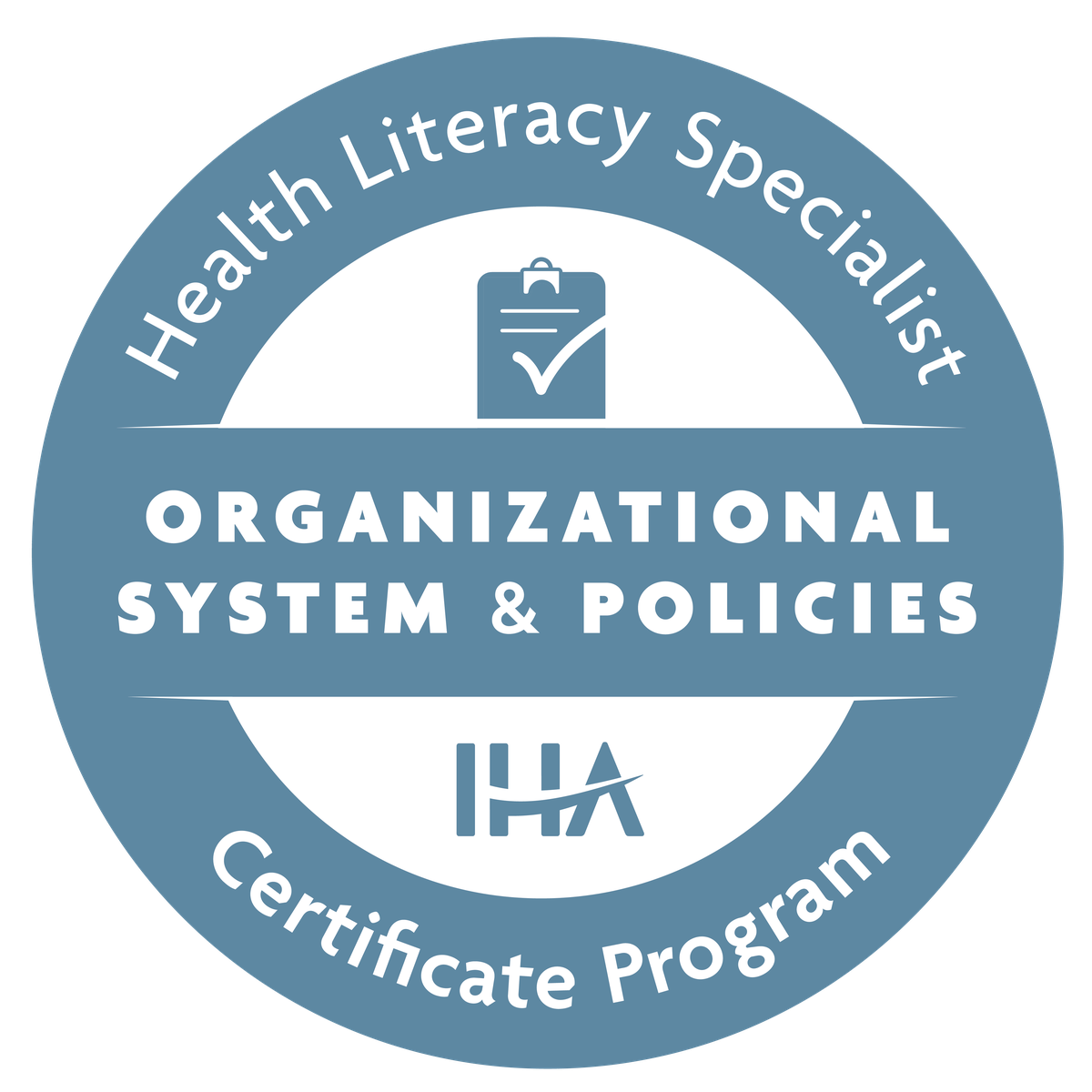
Organizational Systems and Policies
Discover the link between social determinants of health and health literacy, understand the business case for promoting health literacy, and apply health literacy principles when developing policies, procedures, and quality and safety initiatives within organizations.
10 Lessons
Click "Learn More" for Price and Description
Promote health literacy in individual and group education.
Discover the link between social determinants of health and health literacy, understand the business case for promoting health literacy, and apply health literacy principles when developing policies, procedures, and quality and safety initiatives within organizations.
- Lesson 1: You’ll learn what social determinants of health are and how they affect people’s health status. You’ll also learn about strategies to improve health literacy by addressing key social determinants of health.
- Lesson 2: You’ll learn about the rationale for taking a universal precautions approach to health literacy best practices to create an inclusive, accessible, and shame-free environment throughout health organizations and programs. You’ll learn how to implement plain language and teach-back as universal precautions. In addition, you’ll learn about 4 additional health literacy universal precautions and best practices.
- Lesson 3: You’ll learn about 4 concepts that support the business case for health literacy promotion efforts, and why each of those 4 concepts supports the business case for health literacy promotion efforts.
- Lesson 4: You’ll learn how digital tools and technologies support health literacy, and how to assess their appropriateness for specific populations and use cases. In addition, you’ll learn about criteria that organizations can use to evaluate, develop, and select digital tools and technologies with health literacy in mind.
- Lesson 5: You’ll learn about characteristics and examples of high-risk health situations in which it’s critical to ensure understanding. You’ll learn about the rationale for applying health literacy-based strategies to ensure understanding in these situations, and about tools and strategies you can use.
- Lesson 6: You’ll learn how limited health literacy can impact the healthcare system. You’ll also learn about possible solutions for minimizing its impact on the healthcare system.
- Lesson 7: You’ll learn why policies and procedures are key to ensuring a health literate healthcare organization. In addition, you’ll learn about ways that healthcare systems, of any size, can use policies and procedures to embed and sustain research-based health literacy practices into individual and organizational behavior.
- Lesson 8: You’ll learn why leading healthcare accreditation, regulatory, and quality organizations call for incorporating health literacy into quality and safety initiatives. You’ll learn about 3 ways to use health literacy-informed practices to improve quality and safety. Finally, you’ll learn about 3 ways to use quality and safety approaches to improve use of health literacy best practices.
- Lesson 9: You’ll learn what organizational health literacy is. You’ll also learn why it’s important to assess organizational health literacy, and about 3 tools for assessing it.
- Lesson 10: You’ll learn about the role and purpose of accreditation requirements, regulations, and other published standards in health organizations and programs. In addition, you’ll learn about accreditation requirements, regulations, and standards related to health literacy practices and materials, and how health organizations and programs are evaluated for compliance.
Complete all ten lessons and pass the summative exam to earn your Organizational Systems and Policies Micro-credential and digital badge.
This course has been approved for fulfilling the continuing education requirements of the American Health Information Management Association (AHIMA).Earn 10 Continuing Education Credits in the following categories:
- CHES/MCHES (Category 1 Continuing Education Contact Hours) from NCHEC, Provider #101864
- California Nurses CEs from The California Board of Registered Nursing, CEP# 11933
- CPH Recertification Credits from National Board of Public Health Examiners’
| Access Date | Quiz Result | Score | Actions |
|---|
Login Information
Please reset your password if you have trouble logging in.
